Question Response Analysis
Below we set out the questions and analyse the responses received on an individual question basis.
Enforcement Regulations: Proposed Provisions Under Section 59(1) of the Act
Question 1
Do you agree or disagree that the content of a PCN for a parking prohibition contravention should be as set out above?
The total number answering this question was 457 with 5 not answering.
394 respondents (85%) answered agree for this question. 63 respondents (14%) answered disagree, with 5 not giving a response (1%).
88% of the 16 local authorities who answered this question answered agree while 12% answered disagree.
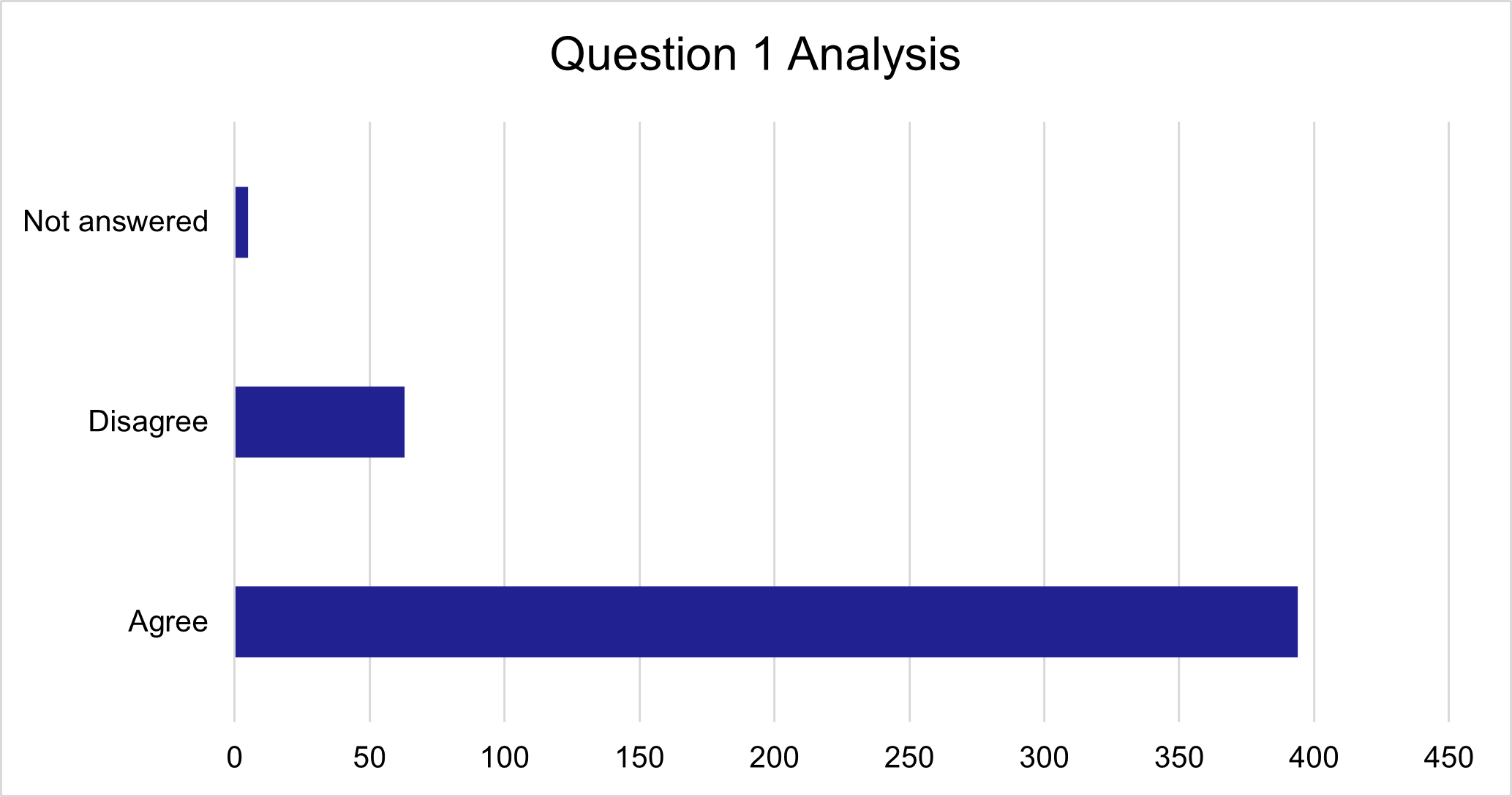
Question 1 Analysis
Of the 208 comments received for question 1, 147 were from respondents who answered agree to question 1 and 60 from those who answered disagree. 1 respondent who left a comment did not answer question 1.
Example comments relating to question 1 are included below:
"Agree" response comments
Individual comments
That seems to cover most of it. I'd say a photograph would also be best practice, but perhaps not for the notice itself."
Local authority comments
The Council agrees with the list of information to be collected when issuing a PCN for the new parking prohibitions.
In addition, we would strongly encourage that Contravention codes, names and any applicable suffixes are finalised prior to enforcement starting. This will ensure consistency across Scotland, avoid confusion for motorists and reduce any unnecessary complaints or appeals from motorists.
However, there are some concerns that ‘detailed location of vehicle’ could be challenging to describe in more rural areas of the city where there may not be as many obvious landmarks, which could be even more challenging for other Local Authorities.
The Council agrees that motorists should be informed of how to pay a PCN, but we would hope that the payment methods themselves (cash, cheque, etc) are not prescribed by Regulation. This would allow the introduction of new payment options that may emerge in the future."
Organisation comments
Content that the proposal follows the information required when issuing a standard PCN with the addition of photographic evidence of the offence and relevant signage or road markings detailing the restrictions in place."
“Disagree” response comments
Individual comments
Third party reporting should be available and online, so that photo/video evidence can be submitted and a PCN issued on this evidence.”
Local authority comments
“Disagree with the colour of vehicle being a statutory requirement. There are so many shades and descriptions of colours this could create a grey area. I am unsure on what basis the colour would be a requirement. The colour would be captured as part of the additional photographic evidence.”
Organisation comments
There is some concern about the ‘Detailed location of vehicle (e.g. street name, side of street, outside or opposite a particular address)’, being needed, as this is not always that easy to provide in rural locations. Most locations have GPS but reliable GPS coordinates are not a given, due to phone signal being non-existent in some of the rural locations. Different approaches are taken by authorities such as referencing local landmarks and the number of metres the contravention is away from a landmark for example. Another point that has been made is to consider including the number of wheels on the pavement which could become a useful detail at the appeal/adjudication stage."
Question 2
Do you agree or disagree with the proposed method of the notification of a PCN as set out above?
The total number answering this question was 457 with 5 not answering.
389 respondents (84%) answered agree to this question. 68 answered disagree (15%), with 5 not giving a response (1%).
100% of the 16 local authorities who answered this question answered agree.
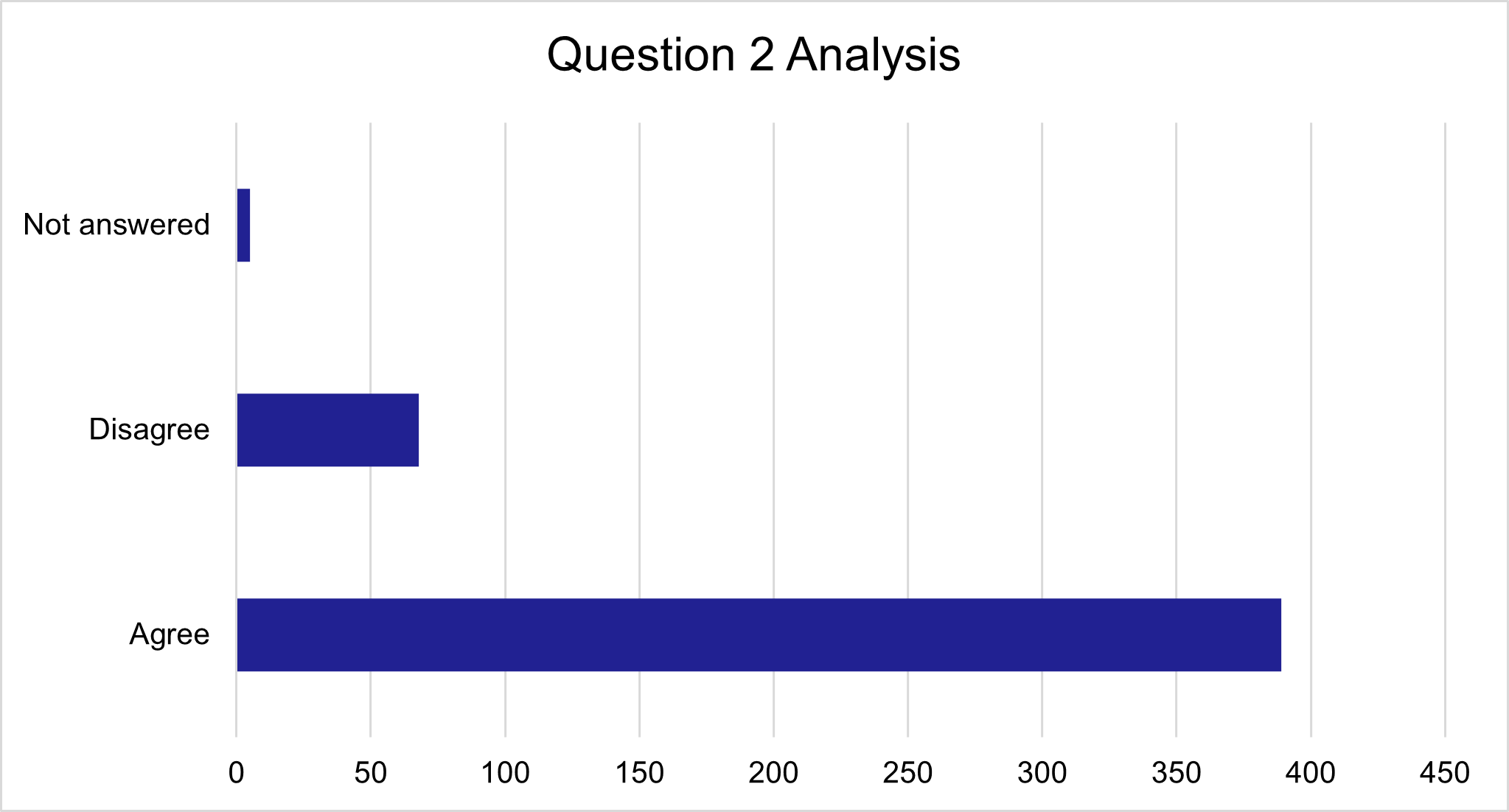
Question 2 Analysis
Of the 178 comments received for question 2, 119 were from respondents who answered agree to question 2 and 59 from those who answered disagree.
Example comments relating to question 2 are included below:
"Agree" response comments
Individual comments
It shouldn't be possible to avoid the fine by moving the vehicle when a parking attendant appears.
Allowing postal notification would be a deterrent as photograph of offending vehicle should be enough.
Shouldn't be able to block pavement and move before ticket attached to vehicle.”
Local authority comments
With the discretion of the local authority, the ability should be there to issue the PCN via post however there should also be the option to cancel or take no further action.”
Organisation comments
We agree with the proposed method of affixing a Penalty Charge Notice to the windscreen of a car or allowing the enforcement officer being able to hand it to the registered keeper of the vehicle. This is also the standard practice which is currently operated for other decriminalized parking enforcements which may incur a Penalty Charge Notice when an infringement takes place. The support for the proposed notification method response is also overwhelmingly supported by our members – 84%.
There is however a concern from disabled people regarding the regularity of enforcement of Parking measures due to the lack of resources in terms of numbers of enforcement officers in some cases.”
“Disagree” response comments
Individual comments
I would suggest that education would be the first solution and if they have moved to a more suitable location then that’s that. If they were persistent offenders and the enforcement officer can demonstrate this, then yes it would be appropriate to write them up.”
Organisation comments
We do not agree that pavement parking should be subject to blanket prohibition to the extent proposed in the legislation and therefore we do not agree with the proposed notification of penalty.
This is an example of a leading question i.e. one which contains its own answer which is approval of the blanket prohibition of pavement parking and we cannot agree with any form of process until the regulation has been made consistent with the reality of parking requirements in our area.”
Question 3
Do you agree or disagree with the proposal for a local authority to be able to issue a PCN to the registered keeper of the vehicle by post, if they have not been able to affix it to a vehicle or give it to the driver?
The total number answering this question was 459 with 3 not answering.
390 respondents (84%) answered agree to this question. 69 answered disagree (15%), with 3 not giving a response (1%).
88% of the 16 local authorities who answered this question answered agree while 12% answered disagree.
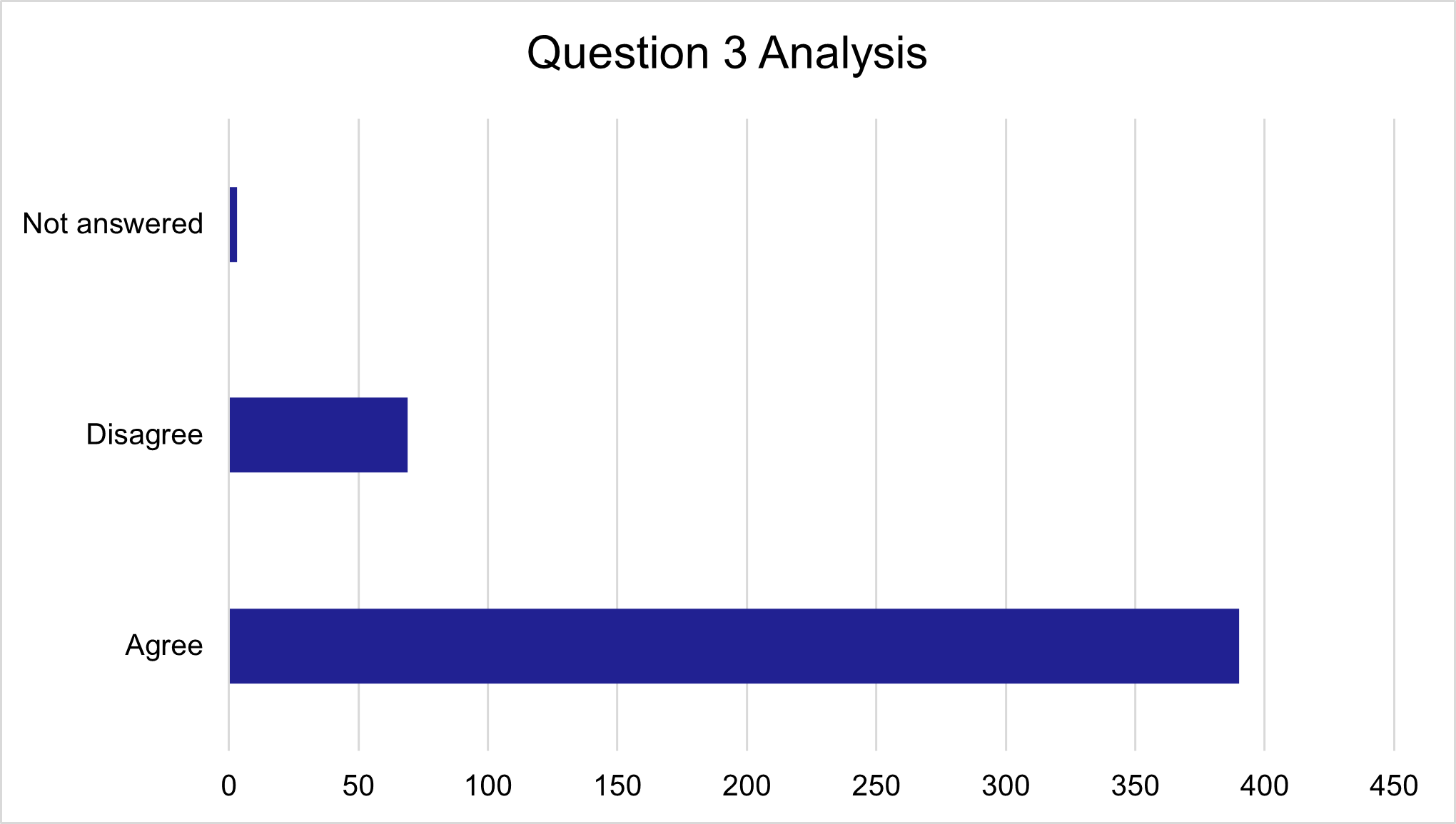
Question 3 Analysis
Of the 191 comments received for question 3, 136 were from respondents who answered agree to question 3 and 55 from those who answered disagree.
Example comments relating to question 3 are included below:
“Agree” response comments
Individual comments
I agree fully with this and it is essential if this enforcement is to be effective. There should be no room for motorists to escape enforcement by simply dashing to their vehicles and running off. The minute a vehicle has been spotted parking in an obstructive manner is should be subject to a PCN, even if it is moved right away. This is essential if there is to be any environment of discouragement around these unsafe and selfish parking practices.”
Local authority comments
Yes, this would be welcomed in terms of following up on drivers who have acted in contravention of the restrictions.”
Organisation comments
But only where the officer witnessed the offence AND had started writing the PCN.”
“Disagree” response comments
Individual comments
The issue is resolved and that ruling simply leads to revenue generation.”
Local authority comments
Our experience of 1% of drive-aways is not a big enough problem to increase the administrative burden and necessarily change our processes to do this.”
Organisation comments
There are inherent problems in issuing an FPN to the vehicle owner, rather than the driver of the vehicle. This can create lengthy correspondence between the LA and the vehicle owner, the cost of which is likely to exceed the actual PCN charge.”
Question 4
Do you agree or disagree with the proposal to make the removal or interference with a PCN, by anyone other than the vehicle owner/person in charge of the vehicle or the enforcement authority, a criminal offence?
The total number answering this question was 457 with 5 not answering.
402 respondents (87%) answered agree to this question. 55 answered disagree (12%), with 5 not giving a response (1%).
88% of the 16 local authorities who answered this question answered agree, 6% answered disagree while 6% did not give a response.
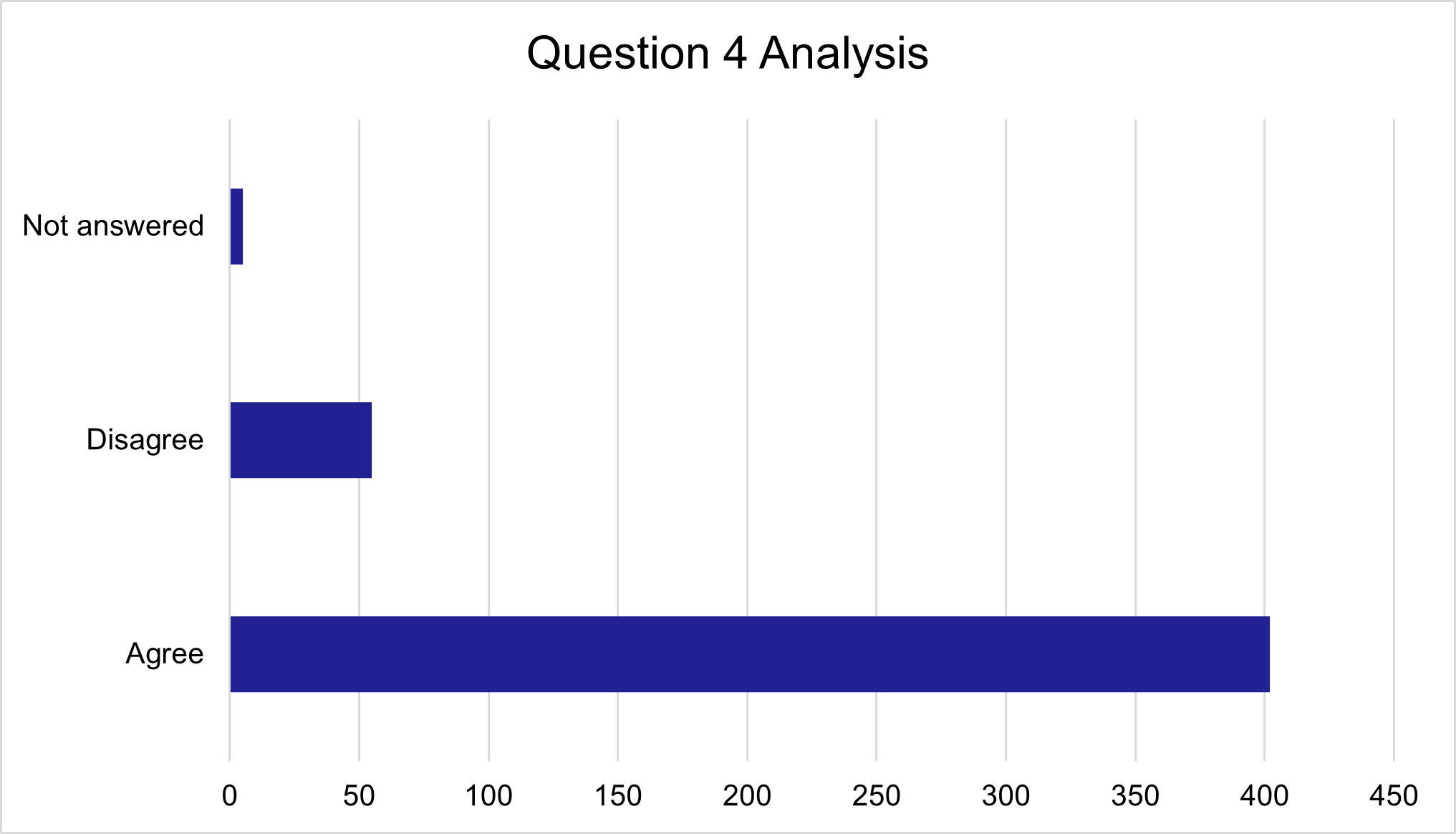
Question 4 Analysis
Of the 140 comments received for question 4, 96 were from respondents who answered agree to question 4 and 43 from those who answered disagree. 1 respondent who left a comment did not answer question 4.
Example comments relating to question 4 are included below:
“Agree” response comments
Individual comments
Sensible, although there should be a way to do this digitally eventually.”
Local authority comments
I agree that it should. However it is highly unlikely that Police Scotland will then take further action on this matter. It would also be difficult to provide the evidence and corroboration required.”
Organisation comments
Consideration needs to be made as to how this will be enforced, particularly if this is a criminal offence, this legislation seeks to enable local authorities to take action but this would not be possible for this offence.”
“Disagree” response comments
Individual comments
Fail to understand the justification for this approach in making parking offences a crime! This is and should remain a civil matter.”
Local authority comments
This being a criminal offence, the question should be asked of the Police, who are the only organisation capable of enforcing it. However, in terms of the practicality of the enforcement of the proposal, the chances of catching the perpetrator in the act are very small and being able to prove it otherwise is impossible.”
Organisation comments
Although we don’t object in principle, there may be circumstances where a person who is not defined above but with legitimate reason may remove the PCN. Many of these offences will be committed outside homes and it is quite likely that family members, other relatives, carers, etc will remove the PCN for passing on to the keeper. In this circumstance, this should not be an offence.”
Question 5
Do you agree with the level of fine which is being suggested?
The total number answering this question was 454 with 8 not answering.
339 respondents (73%) answered agree to this question. 115 answered disagree (25%), with 8 not giving a response (2%).
81% of the 16 local authorities who answered this question answered agree, 13% answered disagree while 6% did not give a response.
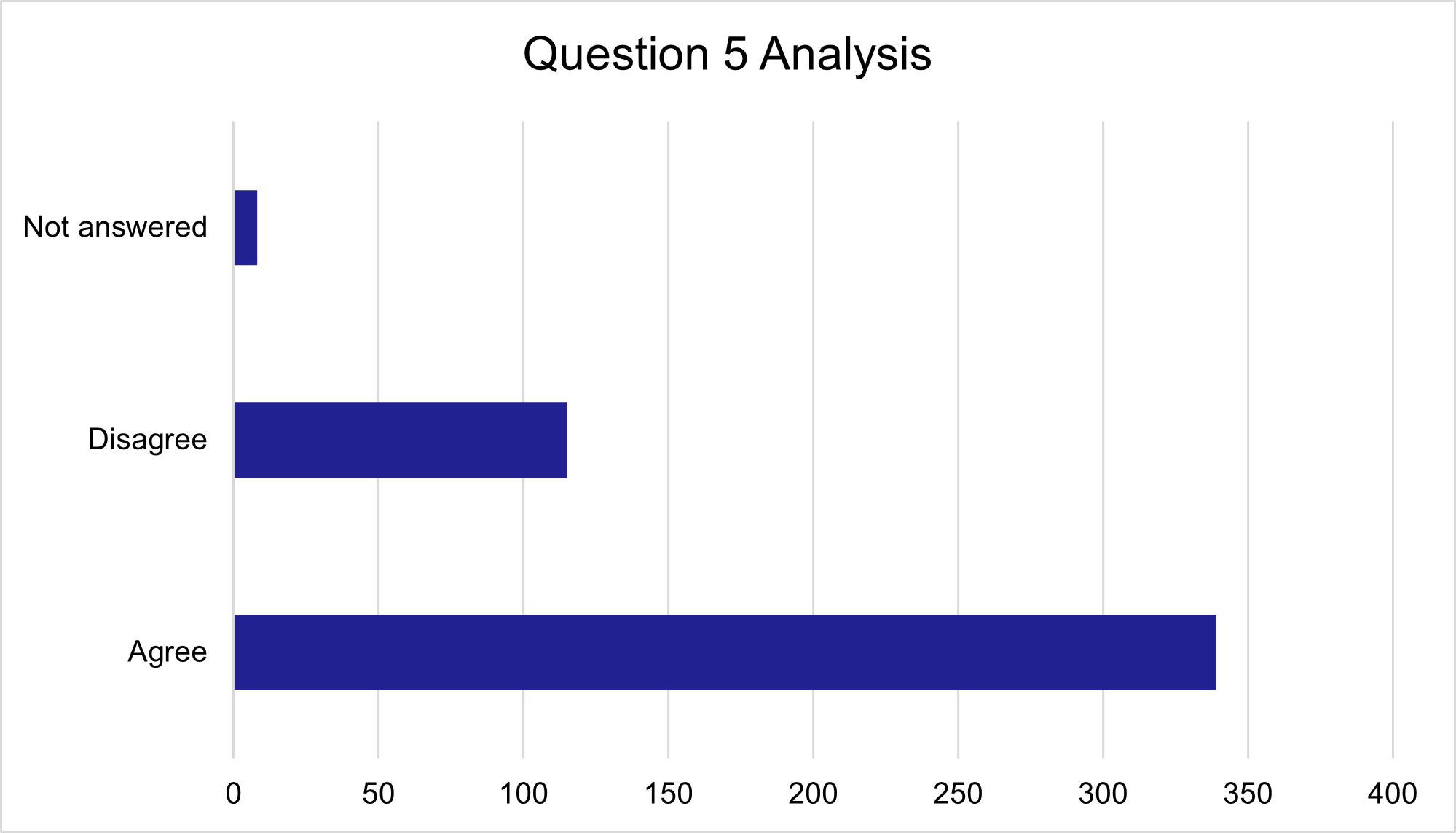
Question 5 Analysis
Of the 173 comments received for question 5, 69 were from respondents who answered agree to question 5 and 103 from those who answered disagree. 1 respondent who left a comment did not answer question 5.
Example comments relating to question 5 are included below:
“Agree” response comments
Individual comments
I do agree, but I think there should be an increased amount if the person continues to violate the rules by continuing to park in a dangerous manner.
The fine should increase each time they continue to park where they shouldn’t, as too many continue to park time after time and then either not pay or try a different way to get round not paying.”
Local authority comments
The Council agrees with the proposed fine level as suggested by Transport Scotland.”
Organisation comments
We believe a £500 fine is a sufficient level of fine for removing PCN and will act as a deterrent. However, the reality of monitoring and enforcing this could pose some problems without CCTV.”
“Disagree” response comments
Individual comments
We cannot issue a static amount for fines. It needs to be dependent on a person's income. Otherwise for some folk, it won't affect them.”
Organisation comments
Only in the context of higher level offences related to road safety, obstructing access and current road traffic offences is a £100 fine justified. A £100 non-discounted fine needs to be considered within the context of the Living Wage, currently £10.42 an hour. Assuming an eight-hour day, a day’s wages becomes £83.36. We do not believe that some of the offences that may incur a fine, such as a wheel on the kerb when parking is tight, justify the loss of a day’s wages for many - even with the penalty being halved within 14 days. In a December 2022 survey, 24% of drivers receiving a penalty charge in Scotland said that they paid it within 14 days even though they did not believe they had committed the offence. The reasons they gave were: it was the easiest option or the full amount would have left them in financial difficulty. The size of the fine must reflect the gravity of the offence.”
Question 6
Do you agree or disagree with the proposed timing and level of discounts and surcharges of a PCN for a parking prohibition contravention as set out above?
The total number answering this question was 459 with 3 not answering.
350 respondents (76%) answered agree to this question. 109 answered disagree (24%), with 3 not giving a response (1%).
94% of the 16 local authorities who answered this question answered agree while 6% answered disagree.
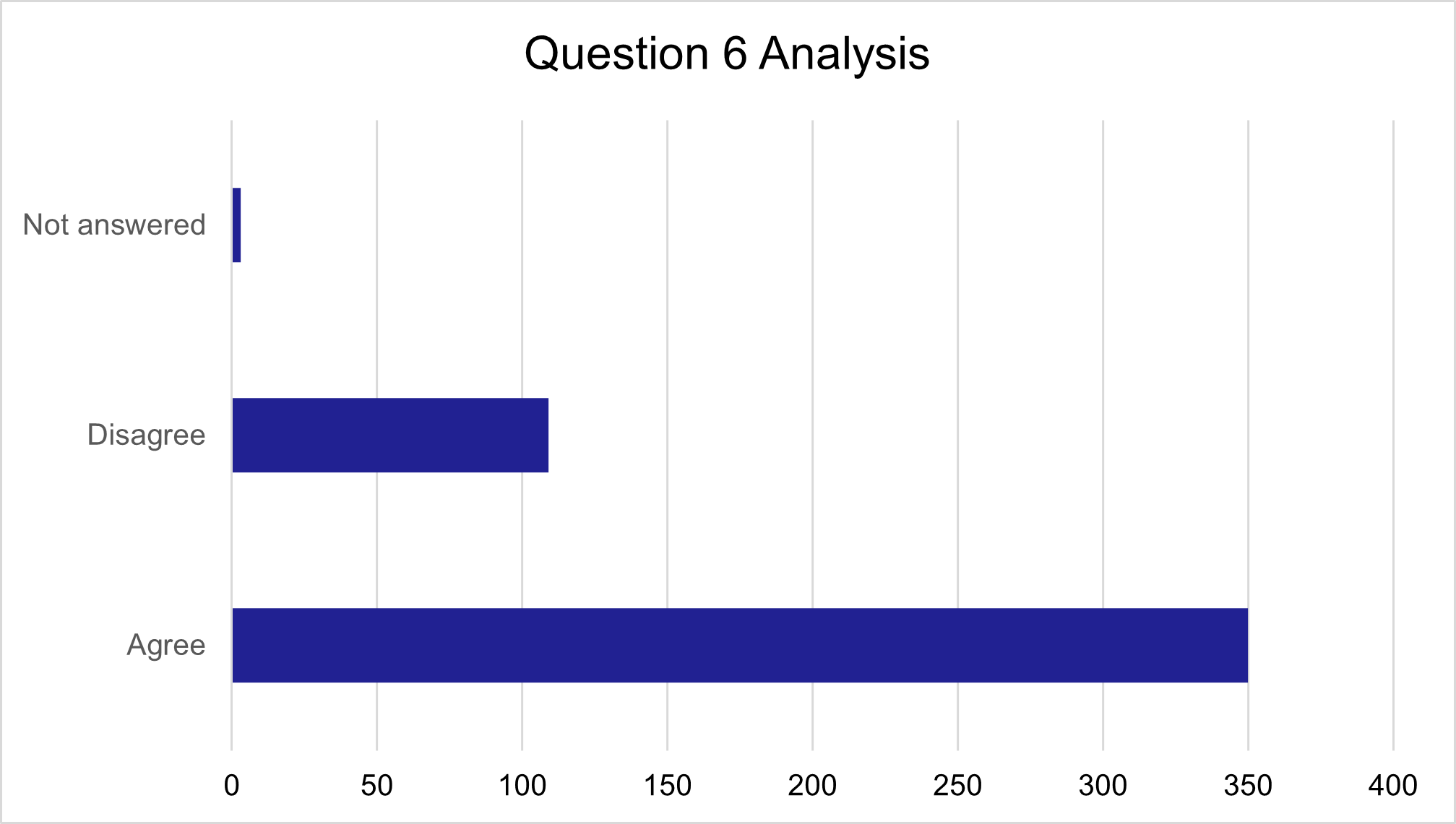
Question 6 Analysis
Of the 182 comments received for question 6, 82 were from respondents who answered agree to question 6 and 100 from those who answered disagree.
Example comments relating to question 6 are included below:
“Agree” response comments
Individual comments
If this is already happening with other parking fines, it makes sense to do the same - should prevent any confusion.”
Local authority comments
Agree as this is in line with existing arrangements.”
Organisation comments
We agree with the proposals put forward. Though when consulting our members while a clear majority supported the proposals there was a good number of members who said that the fine should remain at £100 even for payment within 14 days to act as a deterrent.”
“Disagree” response comments
Individual comments
There should be no discount. As a disabled person who suffers at the hands of inappropriately parked vehicles daily, I believe the fine should be not be subject to discount as my inconvenience is not relieved but drivers saying I’ll only be a few minutes.”
Local authority comments
The current timelines for existing contraventions are as follows:
Date of contravention/ Issue of PCN to end of discount period = 14 days
Date of contravention/ Issue of PCN to issue of Notice to Owner =28 days
Issue of Notice to Owner to issue of Charge Certificate = 28 days
The wording above suggests that the number of days from the issue of the Notice to Owner to the issuing of a Charge Certificate is reduced to 14 days. This introduces a lack of consistency between these contraventions and all of the existing contraventions.
This has the potential to cause issues for system providers and may require development work to be done.
It also raises complications in terms of communication with and the understanding of anyone who has been issued with a PCN.
Our preference would be that the timeline from the issue of a PCN to the issuing of a Charge Certificate for these new contraventions is the same as the existing ones and if that were the case, we would agree with the proposed timescales.”
Organisation comments
We are concerned that a reduced fine for those who can pay within two weeks is effectively a subsidy for drivers on higher incomes who have a more flexible budget across such a short period of time. Functionally lower fines for better-off drivers would not appear to be an effective deterrent, or a just way to treat offenders. This also has significant equality implications, given people in many protected groups (women, both younger and older and disabled people) have lower disposable incomes ability to pay. We suggest organising a payment plan within two weeks is a fairer measure.”
Question 7
Do you agree or disagree with the proposed level of penalty for a PCN issued for a pavement parking, dropped kerb or double parking prohibition contravention as set out above?
The total number answering this question was 456 with 6 not answering.
306 respondents (66%) answered agree to this question. 150 answered disagree (32%), with 6 not giving a response (1%).
75% of the 16 local authorities who answered this question answered agree while 25% answered disagree.
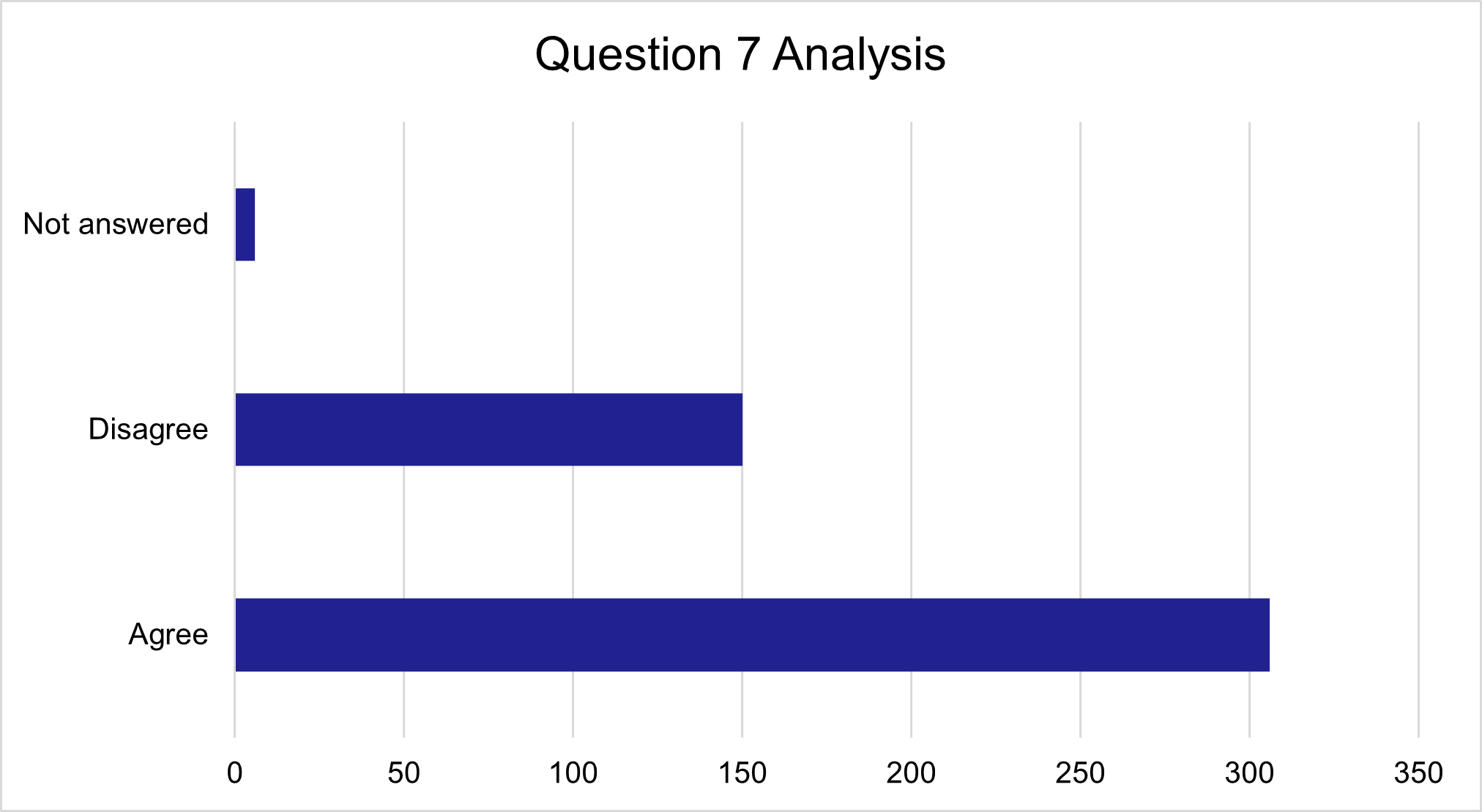
Question 7 Analysis
Of the 227 comments received for question 7, 84 were from respondents who answered agree to question 7 and 141 from those who answered disagree. 2 respondents who left a comment did not answer question 7.
Example comments relating to question 7 are included below:
“Agree” response comments
Individual comments:
It is affordable but yet still a sting for those that are caught. If the charge were less, you'd have people with money willing to pay as the cost wouldn't worry them. This happens in Hong Kong, for example, as parking fines are approx. £32.”
Local authority comments
The Council agrees that the penalty charge level for pavement parking, dropped kerb or double parking prohibitions should be set at the higher level to demonstrate the seriousness of the contraventions and have the greatest impact on driver behaviour to improve compliance in the future. The Council also agrees that the 50% discount rate should remain as standard.
The charge levels should also be kept under regular review and amended in line with other parking PCN levels and inflation as required.”
Organisation comments
Established and enforceable.”
“Disagree” response comments
Individual comments
Appreciate that this may be the highest amount that can be charged at present, but suspect this may not be enough to deter many people.”
Local authority comments
I do not believe the higher level penalty has been set high enough. I believe that tiered contraventions (Higher and lower) should be adopted as in London. With the amount above being the new lower level with a higher level introduced for both the new prohibitions and any of the current prohibitions which are safety related such as Loading Restrictions, Clearways, Bus Stop Clearways, School markings, Waiting Restrictions, Taxi Ranks etc all being the higher level.”
Organisation comments
Disagree. We would prefer a rate of £50 (£25 if paid within 14 days) as this is a complete change in parking procedures for Scottish drivers. A £50 PCN is the level the UK Government is also seeking for charges issued for breach of contract on private land, so we feel this should be the highest level for at least the first two years to allow drivers to familiarise themselves with the new rules and then a review of the amount can commence.”
Question 8
Do you agree or disagree that the registered owner of a vehicle should be responsible for the payment of a PCN for a parking prohibition contravention as set out above?
The total number answering this question was 452 with 10 not answering.
395 respondents (85%) answered agree to this question. 57 answered disagree (12%), with 10 not giving a response (2%).
88% of the 16 local authorities who answered this question answered agree while 12% answered disagree.
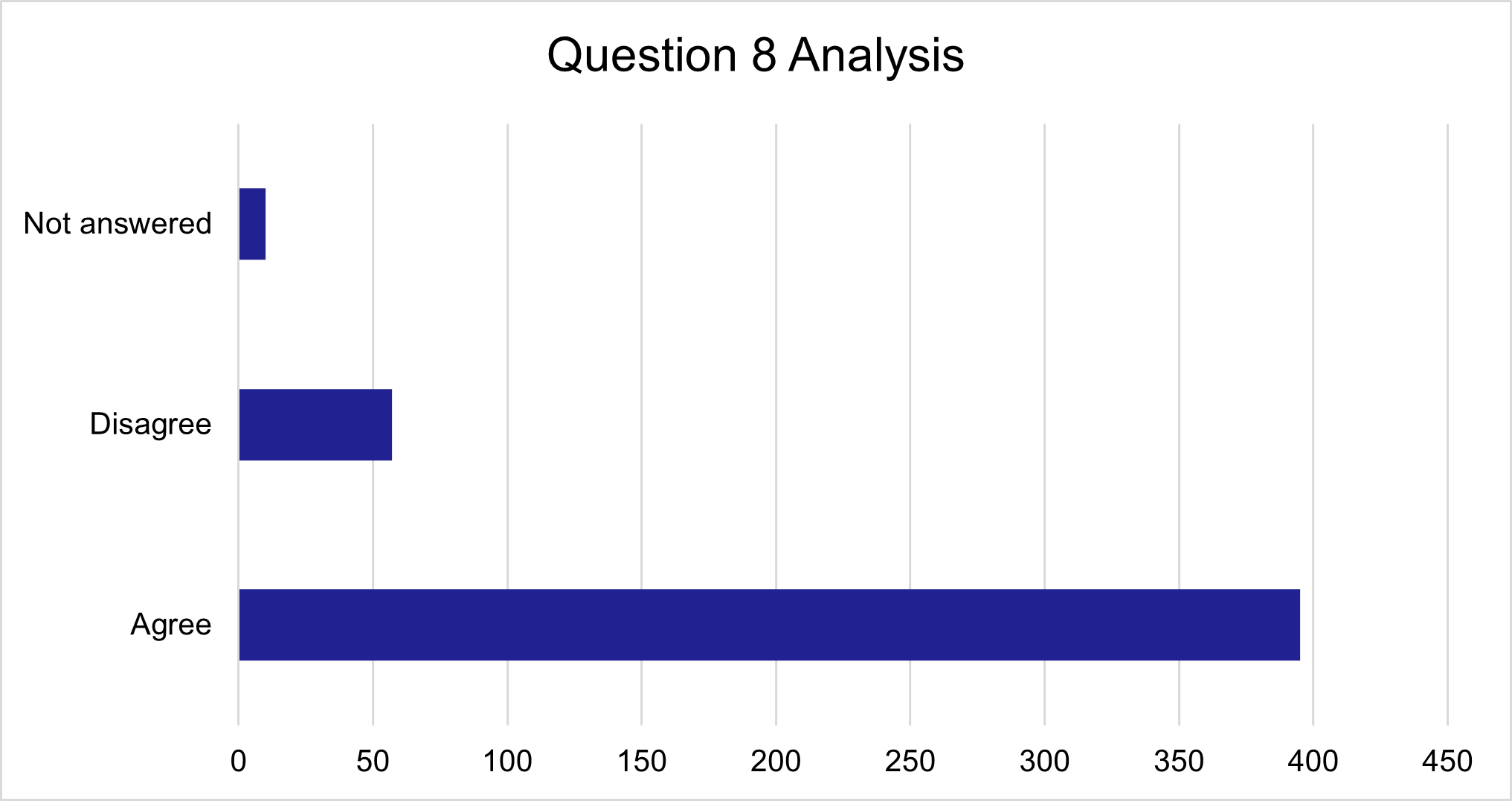
Question 8 Analysis
Of the 117 comments received for question 8, 74 were from respondents who answered agree to question 8 and 42 from those who answered disagree. 1 respondents who left a comment did not answer question 8.
Example comments relating to question 8 are included below:
“Agree” response comments
Individual comments
If the registered owner did not commit the actual offence then that debate should be with the owner and the person they allowed to use the vehicle. It is not for the authorities to get involved in that private debate.”
Local authority comments
We strongly agree that the responsibility lies with the registered owner for the PCN issued. This is clear cut and the best working practice. Placing liability with the driver of a vehicle creates an inadequate process and from experience that can lead to inaccurate information being supplied”
Organisation comments
This process currently works well for enforcement of the parking regulations.”
“Disagree” response comments
Individual comments
I think that the driver should be fined. I don't think charging the owner for someone else's offence is the answer. Those that have broken the law should pay. If, for example, a son has taken his parent's car out, the parents should not be liable, the son should! That way, he will learn. It's the only way. I'm not an older person, but I think young people, as an example, should learn responsibility. Or, simply, those that make mistakes should learn from them, whoever they are.”
Local authority comments
Disagree – there is no such thing as a registered owner. We agree that the Registered Keeper be responsible. Clarification needed here – should be ‘Registered Keeper, not ‘Registered Owner’. We agree that the responsibility for payment should lie with the Registered Keeper.”
Organisation comments
We agree the PCN should initially be sent to the vehicle keeper and we also believe where vehicles are leased or hired that the current established code of passing this on should apply. We also believe that where there is more than one named driver of the vehicle and at the point of offence the driver was NOT the registered keeper, the keeper should be able to appeal or defer the PCN to the person that was using the vehicle when the offence was committed.”
Question 9
Do you agree or disagree that if a vehicle trader commits a parking prohibition contravention, they should be responsible for the payment of a PCN even if they are not the registered keeper?
The total number answering this question was 451 with 11 not answering.
409 respondents (89%) answered agree to this question. 42 answered disagree (9%), with 11 not giving a response (2%).
88% of the 16 local authorities who answered this question answered agree while 12% answered disagree.
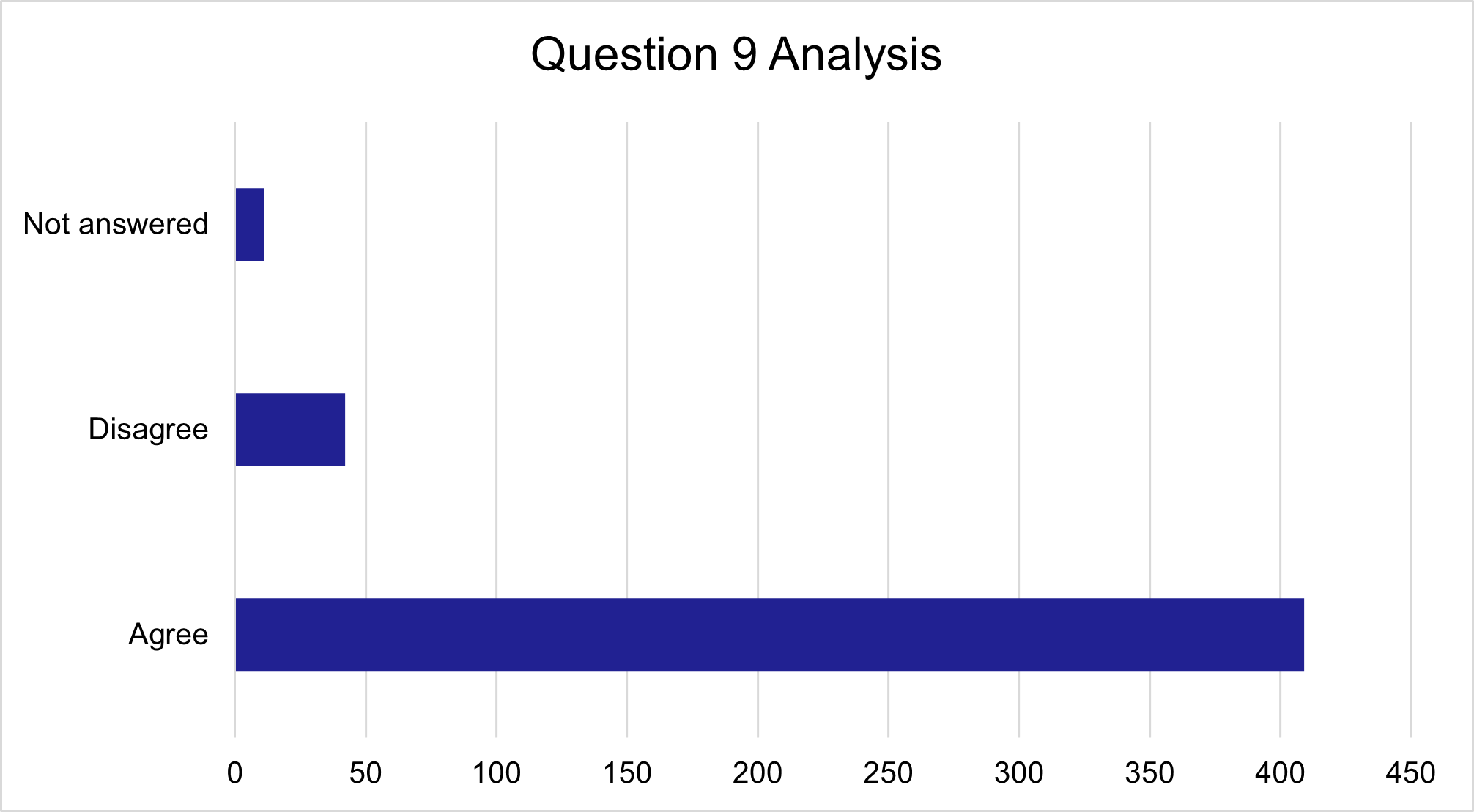
Question 9 Analysis
Of the 107 comments received for question 9, 83 were from respondents who answered agree to question 9 and 23 from those who answered disagree. 1 respondents who left a comment did not answer question 9.
Example comments relating to question 9 are included below:
“Agree” response comments
Individual comments
Penalising someone who hasn't committed an offence is pointless.”
Local authority comments
Agree as they are in control of the vehicle's movements whilst it is in their hands.”
Organisation comments
We would welcome Transport Scotland looking into the transfer of liability.
There is an emerging issue of cross border enforcement becoming difficult where businesses are intentionally using this loophole to avoid paying PCNs. It largely relates to the vehicle recovery sector.”
“Disagree” response comments
Individual comments
Difficult to pursue. The owner will know who committed the offence if it was not them.”
Local authority comments
In the case of car sales, where the garage is the registered owner – Agreed. In the case of car servicing where the garage has parked the car on the pavement while waiting to be worked on – Disagree. The party responsible for parking the car on the pavement would be impossible to prove and would require new fields on the PCN to record the responsible party, who is not the registered keeper. In the same way that a hire company has a signed agreement naming the person responsible for the car, the garage would need to be assigned that responsibility from the owner. This would not be in the garage’s interests and unlikely to be adhered to.”
Organisation comments:
PCNs sent to the registered keeper is the standard practice for issuing PCNs. It is then down to the owner or company recorded as a the registered keeper to pay the fine and manage the transgression of the driver separately.”
Question 10
Do you agree or disagree that the process for appealing a PCN for a parking prohibition contravention as detailed above?
The total number answering this question was 451 with 11 not answering.
364 respondents (79%) answered agree to this question. 87 answered disagree (19%), with 11 not giving a response (2%).
75% of the 16 local authorities who answered this question answered agree while 25% answered disagree.
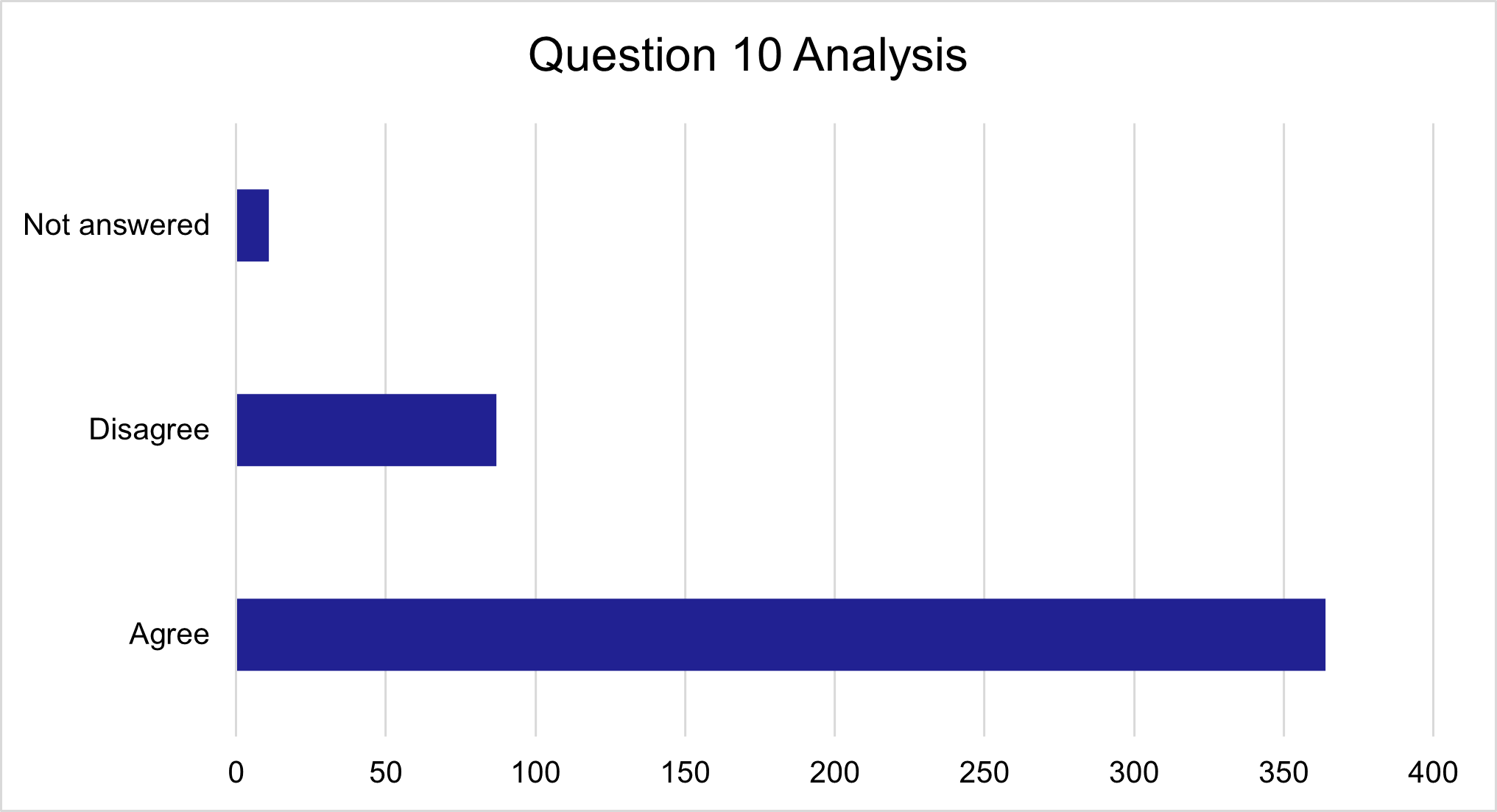
Question 10 Analysis
Of the 156 comments received for question 10, 80 were from respondents who answered agree to question 10 and 74 from those who answered disagree. 2 respondents who left a comment did not answer question 10.
Example comments relating to question 10 are included below:
“Agree” response comments
Individual comments
Agree, but feel that Authorities should only accept "extenuating circumstances" in only the most exceptional of cases.”
Local authority comments
Agree with all except the final bullet point (“The penalty did occur but in light of extenuating circumstances, it would be unreasonable to impose a PCN.”). Local Authorities should have the right to consider mitigating circumstances as they do at present without this being provided as a ground on which the public can lodge an appeal.”
Organisation comments
This process should be well signposted and be fully in line with the inclusive communication principles as set out by Scottish Government.”
“Disagree” response comments
Individual comments
Extenuating circumstances could be a possible get out clause for many reasons. Pavements are for pedestrian use and not for motor vehicles.”
Local authority comments
The Council disagrees with the proposal to use new and different grounds of appeal for parking prohibition contraventions and strongly recommends using the same grounds of appeal that are already in place for all other parking contraventions.
This ensures consistency for all parking contraventions, reduces the need for any developments to existing Local Authority IT systems or further staff training, and removes the need for upgrades to the Transport Appeals Tribunal for Scotland IT systems, which have been unable to adapt to accommodate the recent penalty charge increases.
Terms such as “extenuating circumstances” and “unreasonable” are also subjective and open to interpretation, which could encourage an increase in appeals from motorists with little chance of success. The current grounds of appeal for existing PCNs have already been proven to successfully handle challenges brought by motorists when they believe that extenuating circumstances warrant the cancellation of a PCN.”
Organisation comments
I do agree with the list but would like to see included the following:-
That the PCN was issued to the registered keeper of the vehicle who was not the driver of the vehicle.
(this covers instances where, if the decision is made to issue the PCN by post, rather than fixing it to the vehicle, then the keeper of the vehicle is protected.)”
Enforcement Regulations: Proposed Provisions Under Section 66 of the Act
Question 11
Do you agree or disagree that local authorities should be required to keep accounts for a parking prohibition contravention, similar to the process, detailed above?
The total number answering this question was 451 with 11 not answering.
428 respondents (93%) answered agree to this question. 23 answered disagree (5%), with 11 not giving a response (2%).
100% of the 16 local authorities who answered this question answered agree.
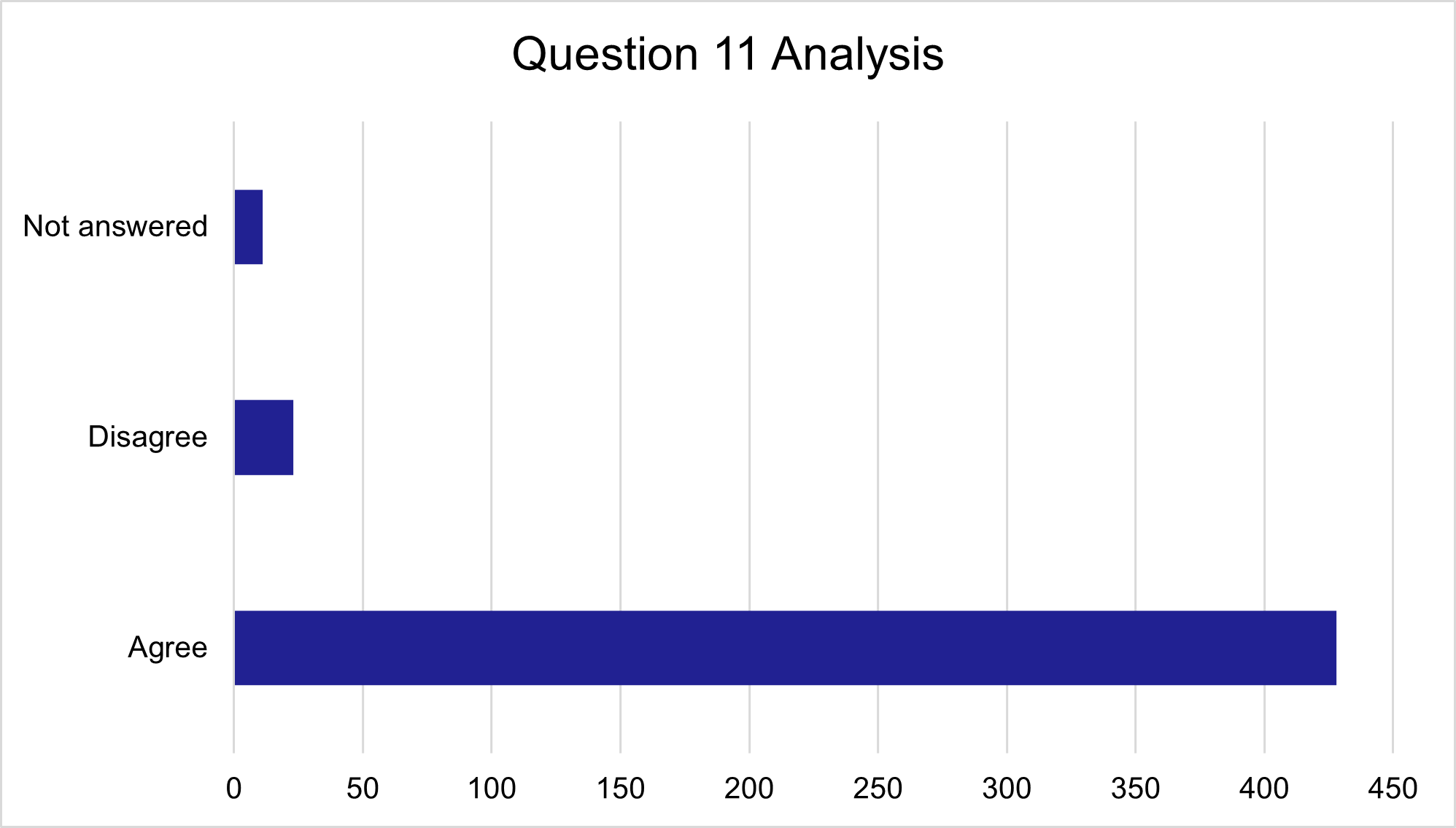
Question 11 Analysis
Of the 108 comments received for question 11, 91 were from respondents who answered agree to question 11 and 16 from those who answered disagree. 1 respondent who left a comment did not answer question 11.
Example comments relating to question 11 are included below:
“Agree” response comments
Individual comments
Monitoring the system is essential to be able to improve it.”
Local authority comments
We agree that local authorities should be required to keep accounts for this contravention as we do with others.”
Organisation comments
We support introducing a requirement that local authorities must keep track of accounts for a parking prohibition contravention.
We believe it would be useful to categorise what the PCN has been given for (Pavement Parking, Dropped Kerb Parking, Double Parking), as to monitor the types of dangerous parking which have occurred. Being aware of what types of parking the fines have been given for will allow us to gather specific data to assess how effective the PCNs are as a tool for enforcement on the legislation in different local authorities and/or what other methods can be put in place alongside. This data will also be useful to create and target awareness campaigns on the ban and how best to support blind and partially sighted people.”
“Disagree” response comments
Individual comments
This information should not be gathered in such a way.”
Question 12
Do you agree or disagree that any surplus made by local authorities for the enforcement of the parking prohibitions should be ring-fenced and used for certain transport-related purposes, similar to the process detailed above?
The total number answering this question was 453 with 9 not answering.
355 respondents (77%) answered agree to this question. 98 answered disagree (21%), with 9 not giving a response (2%).
94% of the 16 local authorities who answered this question answered agree while 6% answered disagree.
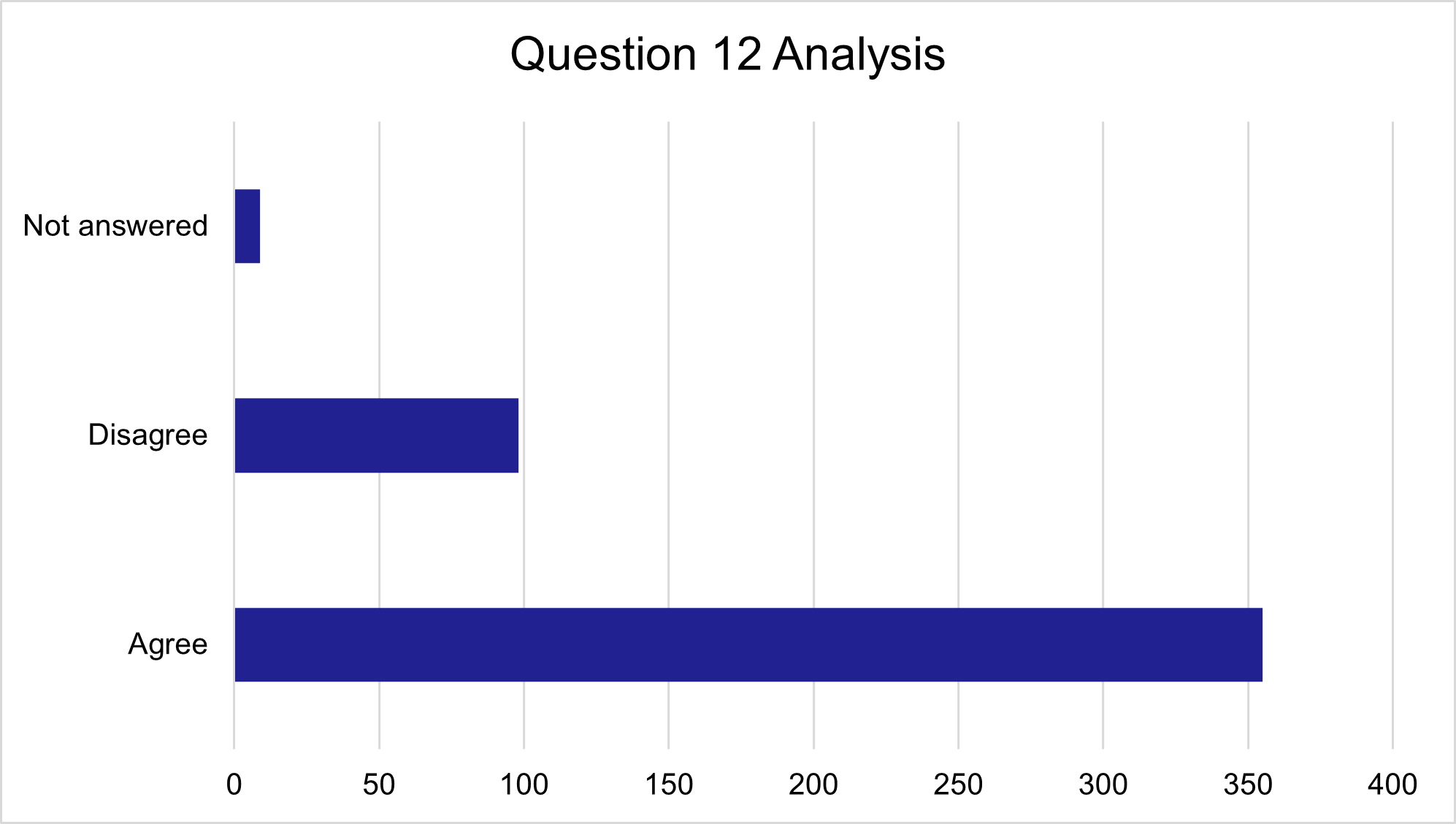
Question 12 Analysis
Of the 222 comments received for question 12, 129 were from respondents who answered agree to question 12 and 90 from those who answered disagree. 3 respondents who left a comment did not answer question 12.
Example comments relating to question 12 are included below:
“Agree” response comments
Individual comments
Except that any surplus should be specifically used for maintaining footways, where there is no Exemption Order in place, improving existing footways and creating new footways.”
Local authority comments
If the funds are not ring fenced as they are currently. It is highly likely that the majority of any surplus would be used to plug gaps elsewhere in council budgets. Therefore there would be a considerable shortfall in spending on roads and infrastructure and public transport infrastructure.”
Organisation comments
With local authority budgets under such pressure it is vital the surplus is ring-fenced for transport related purposes. Transport Scotland has ambitious net zero targets so why not support this by including ‘improvements to active travel’ too, in addition to public transport provision?”
“Disagree” response comments
Individual comments
It should be used to improve and prioritise active travel facilities, such as footway repairs, better lighting where needed, cycling infrastructure (not merely painted lanes but physically segregated), create Low Traffic Neighbourhoods, and safe walking and cycling routes to schools.”
Local authority comments
We disagree that any surplus made should be ring-fenced for transport related issues but should be used for parking related issues, remedial works, etc.”
Organisation comments
We do not agree that surplus from fines levied for blocking and damaging pedestrian infrastructure should be spent on providing parking infrastructure for cars. Surplus income should be used to maintain footways and accessibility ahead of any other purpose.”
Question 13
Do you agree or disagree that local authorities should be required to submit their accounts in relation to the enforcement of the parking prohibitions, similar to the process, detailed above?
The total number answering this question was 448 with 14 not answering.
422 respondents (91%) answered agree to this question. 26 answered disagree (6%), with 14 not giving a response (3%).
88% of the 16 local authorities who answered this question answered agree while 12% answered disagree.
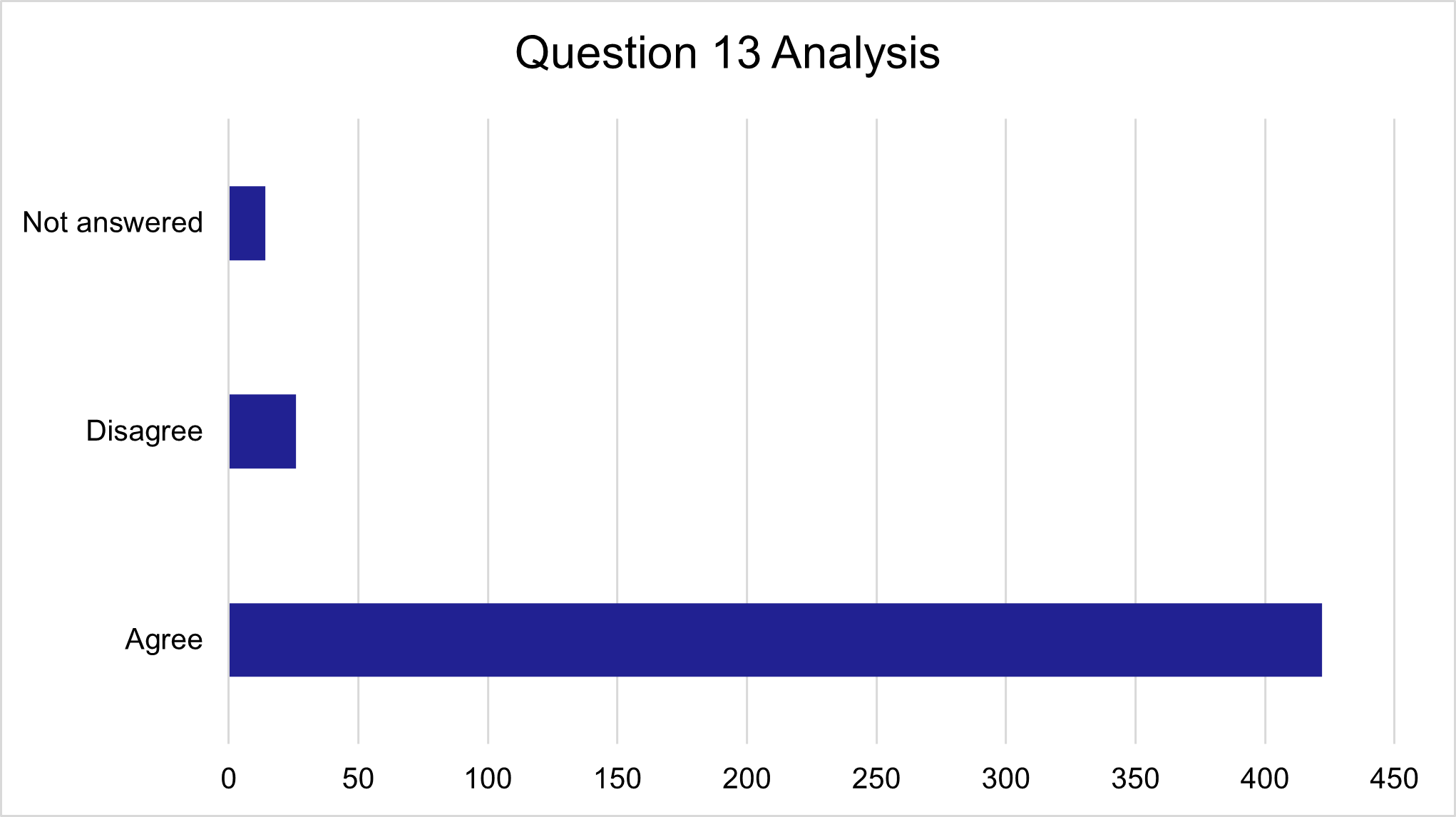
Question 13 Analysis
Of the 97 comments received for question 13, 77 were from respondents who answered agree to question 12 and 16 from those who answered disagree. 4 respondents who left a comment did not answer question 13.
Example comments relating to question 13 are included below:
“Agree” response comments
Individual comments
Once again, openness and accountability are paramount.”
Local authority comments
The Council agrees that reporting of PCN numbers and income should follow the same process as currently exists for PCNs.”
Organisation comments
We agree. Local authorities should submit their accounts, the data should be made available to the public on the local authority website and through Freedom of Information requests.”
“Disagree” response comments
Individual comments
This should form a normal part of their record keeping for income and expenditure and only submitted as part of their wider accounts.”
Local authority comments
This process aligns with DPE and therefore no issue providing that the authority also has DPE.
If the LA does not have DPE then there should not be a requirement to submit accounts.”